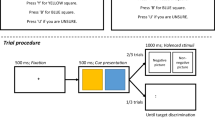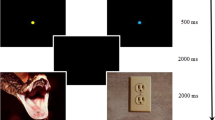Abstract
Background
Anxious people show an attentional bias towards threatening information.
Purpose
It was investigated whether an attentional bias exists for cancer-related stimuli in breast cancer survivors and if different levels of fear of cancer recurrence would lead to different patterns of selective attention.
Methods
Breast cancer survivors with high (n = 35) and low (n = 32) fear of cancer recurrence were compared to 40 healthy female hospital employees. Specificity of attentional biases was investigated using a modified Emotional Stroop Task. Self-report measures were used to assess depression and anxiety, feelings of fatigue, and experienced traumas.
Results
Compared to control participants, breast cancer survivors with both high and low levels of fear of cancer recurrence showed increased interference for cancer-related words, but not for other word types.
Conclusions
The findings suggest a specific attentional bias for cancer-related words in breast cancer survivors that is independent of level of fear of cancer recurrence.
Similar content being viewed by others
References
Clark LA, Watson D, Mineka S. Temperament, personality, and the mood and anxiety disorder. J Abnorm Psychol. 1994; 103: 103-116.
Eysenck HJ. The structure of human personality. New York: Methuen; 1970.
Eysenck HJ. Dimensions of personality. New York: New Brunswick; 1998.
Watson D, Clark LA. Negative affectivity: The disposition to experience aversive emotional states. Psychol Bull. 1984; 96: 465-490.
Williams JMG, Mathews A, MacLeod C. The emotional Stroop task and psychopathology. Psychol Bull. 1996; 120: 3-24.
Mogg K, Bradley BP. A cognitive-motivational analysis of anxiety. Behav Res Ther. 1998; 36: 809-848.
Foa EB, Huppert JD, Cahill SP. Emotional processing theory: An update. In: Rotbaum BO, ed. The nature and treatment of pathological anxiety. New York: Guilford; 2006: 3-24.
Williams JMG, Watts FN, MacLeod C, Matthews A. Cognitive psychology and emotional disorders. 2nd ed. Chichester: Wiley; 1997.
Foa EB, Kozak MJ. Emotional processing of fear: Exposure to corrective information. Psychol Bull. 1986; 99: 20-35.
Schmidt NB, Richey JA, Buckner JD, Timpano KR. Attention training for generalized social anxiety disorder. J Abnorm Psychol. 2009; 118: 5-14.
Amir N, Beard C, Burns M, Bomyea J. Attention modification program in individuals with generalized anxiety disorder. J Abnorm Psychol. 2009; 119: 28-33.
Beard C, Weisberg RB, Amir N. Combined cognitive bias modification treatment for social anxiety disorder: A pilot trial. Depress Anxiety. 2011; 28: 981-988.
MacLeod C, Mathews A. Cognitive bias modification approaches to anxiety. Annu Rev Clin Psychol. 2012; 8: 189-217.
Vickberg SM. The Concerns About Recurrence Scale (CARS): A systematic measure of women’s fear about the possibility of breast cancer recurrence. Ann Behav Med. 2003; 25: 16-24.
Deimling GT, Bowman KF, Sterns S, Wagner LJ, Kahana B. Cancer-related health worries and psychological distress among older adult, long-term cancer survivors. Psychooncology. 2006; 15: 306-320.
Hodges LJ, Humphris GM. Fear of recurrence and psychological distress in head and neck cancer patients and their carers. Psychooncology. 2009; 18: 841-848.
Llewellyn CD, Weinman J, McGurk M, Humphris G. Can we predict which head and neck cancer survivors develop fears of recurrence? J Psychosom Res. 2008; 65: 525-532.
Mehta SS, Lubeck DP, Pasta DJ, Litwin MS. Fear of cancer recurrence in patients undergoing definitive treatment for prostate cancer: Results from CaPSURE. J Urol. 2003; 170: 1931-1933.
Simard S, Savard J, Ivers H. Fear of cancer recurrence: Specific profiles and nature of intrusive thoughts. J Cancer Surviv. 2010; 4: 361-371.
Skaali T, Fossa SD, Bremnes R, et al. Fear of recurrence in long-term testicular cancer survivors. Psychooncology. 2009; 18: 580-588.
Stanton AL, Noff-Burg S, Huggins ME. The first year after breast cancer diagnosis: Hope and coping strategies as predictors of adjustment. Psychooncology. 2002; 11: 93-102.
Humphris GM, Rogers S, McNally D, Lee-Jones C, Brown J, Vaughan D. Fear of recurrence and possible cases of anxiety and depression in orofacial cancer patients. Int J Oral Maxillofac Surg. 2003; 32: 486-491.
Lee-Jones C, Humphris G, Dixon R, Hatcher MB. Fear of cancer recurrence—a literature review and proposed cognitive formulation to explain exacerbation of recurrence fears. Psychooncology. 1997; 6: 95-105.
Northouse LL. Mastectomy patients and the fear of cancer recurrence. Cancer Nurs. 1981; 4: 213-220.
Simard S, Thewes B, Humphris G, et al. Fear of cancer recurrence in adult cancer survivors: A systematic review of quantitative studies. J Cancer Surviv. 2013; 7: 300-322.
MacLeod C, Hagan R. Individual differences in the selective processing of threatening information, and emotional responses to a stressful life event. Behav Res Ther. 1992; 30: 151-161.
Erblich J, Montgomery GH, Valdimarsdottir HB, Cloitre M, Bovbjerg DH. Biased cognitive processing of cancer-related information among women with family histories of breast cancer: Evidence from a cancer Stroop task. Health Psychol. 2003; 22: 235-244.
DiBonaventura MD, Erblich J, Sloan RP, Bovbjerg DH. A computerized Stroop task to assess cancer-related cognitive biases. Behav Med. 2010; 36: 37-43.
Taylor LM, Espie CA, White CA. Attentional bias in people with acute versus persistent insomnia secondary to cancer. Behav Sleep Med. 2003; 1: 200-212.
Carpenter KM, Eisenberg S, Weltfreid S, Low CA, Beran T, Stanton AL. Characterizing biased cancer-related cognitive processing: Relationships with BRCA1/2 genetic mutation status, personal cancer history, age, and prophylactic surgery. Health Psychol. 2013. doi:10.1037/a0032737.
Glinder JG, Beckjord E, Kaiser CR, Compas BE. Psychological adjustment to breast cancer: Automatic and controlled responses to stress. Psychol Health. 2007; 22: 337-359.
Custers JA, van den Berg SW, van Laarhoven HW, Bleiker EM, Gielissen MF, Prins JB. The Cancer Worry Scale: Detecting fear of recurrence in breast cancer survivors. Cancer Nurs. 2014; 37: E44-E50.
Becker ES, Rinck M, Margraf J, Roth WT. The emotional Stroop effect in anxiety disorders: Emotionality or specificity? J Anxiety Disord. 2001; 15: 147-159.
Stroop JR. Studies of interference in serial verbal reactions. J Exp Psychol. 1935; 18: 643-661.
Gielissen MFM, Schattenberg AVM, Verhagen CAHH, Rinkes MJ, Bremmers MEJ, Bleijenberg G. Experience of severe fatigue in long-term survivors of stem cell transplantation. Bone Marrow Transplant. 2007; 39: 595-603.
Servaes P, Verhagen S, Schreuder B, Veth RPH, Bleijenberg G. Fatigue after treatment for malignant and benign bone and soft tissue tumors. J Pain Symptom Manage. 2003; 26: 1113-1122.
Douma KFL, Aaronson NK, Vasen HFA, et al. Psychological distress and use of psychosocial support in familial adenomatous polyposis. Psychooncology. 2010; 19: 289-298.
Vercoulen JHMM, Swanink CMA, Fennis JFM, Galama JMD, van der Meer JWM, Bleijenberg G. Dimensional assessment of chronic fatigue syndrome. J Psychosom Res. 1994; 38: 383-392.
Beurskens AJHM, Bultmann U, Kant I, Vercoulen JHMM, Bleijenberg G, Swaen GMH. Fatigue among working people: Validity of a questionnaire measure. Occup Environ Med. 2000; 57: 353-357.
Zigmond AS, Snaith RP. The hospital anxiety and depression scale. Acta Psychiatr Scand. 1983; 67: 361-370.
Spinhoven PH, Ormel J, Sloekers PPA, Kempen GIJM, Speckens AEM, van Hemert AM. A validation study of the hospital anxiety and depression scale (HADS) in different groups of Dutch subjects. Psychol Med. 1997; 27: 363-370.
Van der Ploeg E, Mooren TTM, Kleber RJ, Van der Velden PG, Brom D. Construct validation of the Dutch version of the impact of event scale. Psychol Assess. 2004; 16: 16-26.
MacLeod C, Rutherford EM. Anxiety and the selective processing of emotional information: Mediating roles of awareness, trait and state variables, and personal relevance of stimulus materials. Beh Res Ther. 1992; 30: 479-491.
van Amstel FK P, van den Berg SW, van Laarhoven HW, Gielissen MF, Prins JB, Ottevanger PB. Distress screening remains important during follow-up after primary breast cancer treatment. Support Care Cancer. 2013; 21: 2107-2115.
Author(s) Statement of Conflict of Interest and Adherence to Ethical Standards
Author Custers, Author Becker, Author Gielissen, Author van Laarhoven, Author Rinck and Author Prins declare that they have no conflict of interest. All procedures, including the informed consent process, were conducted in accordance with the ethical standards of the responsible committee on human experimentation (institutional and national) and with the Helsinki Declaration of 1975, as revised in 2000.
Author information
Authors and Affiliations
Corresponding author
About this article
Cite this article
Custers, J.A.E., Becker, E.S., Gielissen, M.F.M. et al. Selective Attention and Fear of Cancer Recurrence in Breast Cancer Survivors. ann. behav. med. 49, 66–73 (2015). https://doi.org/10.1007/s12160-014-9632-9
Published:
Issue Date:
DOI: https://doi.org/10.1007/s12160-014-9632-9




